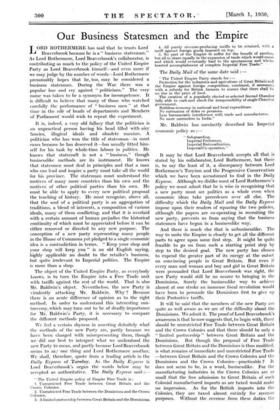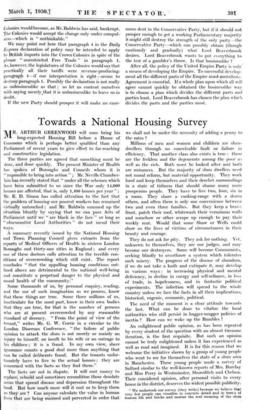Our Business Statesmen and the Empire T ORD ROTHERMERE has
said that he trusts Lord Beaverbrook because he is a " business statesman." As Lord Rothermere, Lord Beaverbrook's collaborator, is contributing as much to the policy of the United Empire Party as Lord Beaverbrook himself—and even more if we may judge by the number of words—Lord Rothermere presumably hopes that he, too, may be considered a business statesman. During the War there was a popular hue and cry against " politicians." The very name was taken to be a synonym for incompetence. It is difficult to believe that many of those who watched carefully the performance of " business men " at that time in the role of heads of departments and Members of Parliament would wish to repeat the experiment.
It is, indeed, a very old fallacy that the politician is an unpractical person having his head filled with airy fancies, illogical ideals and obsolete maxims. A politician who has won the title of statesman—in most cases because he has deserved it—has usually fitted him- self for his task by whole-time labour in politics. He knows that statecraft is not a " business," though businesslike methods are its instrument. He knows that statesmen must deal in principles and that a man who can lead and inspire a party must take all the world for his province. The statesman must understand the motives of many more countries than his own and the motives of other political parties than his own. He must be able to apply to every new political proposal the teaching of history. He must recognize, above all, that the soul of a political party is an aggregation of traditions, a blend of interests, a composition of various ideals, many of them conflicting, and that it is overlaid with a certain amount of human prejudice the historical continuity of which must be appreciated before it can be either removed or directed to any new purpose. The conception of a new party representing many people in the House of Commons yet pledged to a single economic idea is a contradiction in terms. " Keep your shop and your shop will keep you " is an old English saying, highly applicable no doubt to the retailer's business, hilt quite irrelevant to Imperial politics. The Empire is more than 'a shop.
The object of the United Empire Party, as everybody knows, is to turn the Empire into a Free Trade unit with tariffs against the rest of the world. That is also Mr. Baldwin's object. Nevertheless, the new Party is virulently attacking Mr. Baldwin. Why ? Because there is an acute difference of opinion as to the right method. In order to understand this interesting con- troversy, which may turn out to be of deadly importance for ' Mr. Baldwin's Party, it is necessary to compare the different methods proposed.
We feel a certain shyness in asserting definitely what the methods of the new Party are, partly because we have been charged with misrepresenting them, though we did our best to interpret what we understood the new Party to mean, and partly because Lord Beaverbrook seems' to say one thing and Lord Rothermere another. We shall, therefore, quote from a leading article in the Daily Express of Tuesday. As the Daily Express is Lord Beaverbrook's orgin the words below may be accepted as authoritative. The Daily Express said
" The United Empire policy of Empire Free Trade is : 1. Unrestricted Free Trade between Great Britain and the Crown Colonies.
2. Unrestricted Free Trade between the Dominions and the Crown Colonies.
3. A limited partnership between Crest Britain and the Dominions.. 4. All purely revenue-producing tariffs to be. retained, with tariff against foreign goods imposed on top. 5. No part of the Empire to suffer for the benefit of another, but all to share equally in the expansion of trade which wouldensue and which would eventually lead to the spontaneous and whole: hearted accomplishment of complete Imperial Free' Trade." •
The Daily Mail of the same date said :- " The United Empire Party stands for
Protection for the industries and agriculture of Great Britain and the Empire against foreign competition, combined; if necessary, with a subsidy for British farmers to ensure that there shall be. no rise in the price of food. The creation of a popularly elected or selected Second Chamber fully able to curb and check the irresponsibility of single-Chamber government. Ruthless economy in national and local expenditure.
No extensions of doles or pensions. Less bureaucratic interference with trade and manufactures. No more surrenders in India."
Mr. Baldwin has succinctly described his Imperial economic policy as :— " Safeguarding,
Imperial Preference, Imperial Rationalization, Imperial Co-operation."
It may be that Lord Beaverbrook accepts all that is stated by his collaborator, Lord Rothermere, but there is, to say the least of it, a discrepancy between Lord Rothermere's Toryism and the Progressive Conservatism which we have been accustomed to find in the Daily Express. Although we dislike most of Lord Rothermere's policy we must admit that he is wise in recognizing that a new party must see politics as a whole even when economic ideas take precedence over all else. The difficulty which the Daily Mail and the Daily Express impose upon their readers of squaring the two policies, although the papers are co-operating in recruiting the new party, prevents us from saying that the business statesmen have begun in a businesslike way.
And there is much else that is unbusinesslike. The way to unite the Empire is clearly to get all the different parts to agree upon some first step. It might be quite feasible to go on from such a starting point step by step to the desired goal. The new party has chosen to expend the greater part of its energy at the outset on convincing people in Great Britain. But even if every man and woman and boy and girl in Great Britain were persuaded that Lord Beaverbrook was right, the new Party would still be no nearer to bringing in the Dominions. Surely the businesslike way to achieve almost at one stroke an immense fiscal revolution would have been to persuade the Dominions first to give up their Protective tariffs.
It will be said that the members of the new Party arc quite as well aware as we are of the difficulty about the Dominions. We admit it. The proof of Lord Beaverbrook's awareness is that he now suggests that, to begin with, there should be unrestricted Free Trade between Great Britain and the Crown Colonies and that there should be only a " limited partnership " between Great Britain and the Dominions. But though the proposal of Free Trade between Great Britain and the Dominions is thus modified, is what remains of immediate and unrestricted Free Trade —between Great Britain and the Crown Colonies and the Dominions and the Crown Colonies—practicable ? It does not seem to be, in a word, -businesslike. For the manufacturing industries in. the Crown Colonies are so small that the free admission to Great. Britain of such Colonial manufactured imports as are taxed. would .inake no impression.. As for the British imports into the Colonies, they are taxed almost. ,entirely for ,revenue purposes. Without the .revenue from these duties the Colonies would become, as Mr. Baldwin has said, bankrupt. The Colonies would accept the change only under compul- sion—which is " unthinkable."
We may point out here that paragraph 4 in the Daily Express declaration of policy may be intended to apply to British imports into the Crown Colonies M spite of the phrase " unrestricted. Free _ Trade " in paragraph 1.. As, however, the legislatures of the Colonies would say that practically all their tariffs were revenue-producing, paragraph 4—if our interpretation is right—seems to destroy paragraph 1. Possibly the dec-laratiOn is not really so unbusinesslike as that ; so let us content ourselves with. saying merely_that it is unbusinesslike to leave us in doubt. • If the new Party should prosper it will make an enor- mous dent in the Conservative Party, but -if it should not prosper enough to get a working Parliamentary majority it might still destroy the strength of the only party—the Conservative Party—which can possibly obtain (though cautiously and gradually) what Lord Beaverbrook desires. Lord Beaverbrook wants to put everything to the test of a gambler's throw. Is that businesslike ?
After all, the policy of the United Empire Party is only a means of developing the Empire. To successful develop- ment all the different parts of the Empire must contribute. Agreement is essential. If a whole plan upon which all will agree cannot quickly be obtained the businesslike way is to choose a plan which divides the different parts and parties least. Lord Beaverbrook has chosen the plan which divides the parts and the parties most.

























































 Previous page
Previous page